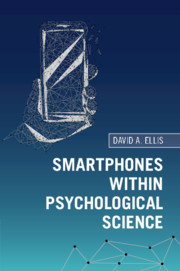Book contents
- Smartphones within Psychological Science
- Smartphones within Psychological Science
- Copyright page
- Dedication
- Contents
- Figures
- Tables
- Preface
- Acknowledgements
- Introduction
- Chapter 1 Smartphone Usage
- Chapter 2 Health and Behaviour Change
- Chapter 3 Social Interaction and Interpersonal Relationships
- Chapter 4 Personality and Individual Differences
- Chapter 5 Cognition
- Chapter 6 Safety and Security
- Conclusion
- References
- Index
- References
Introduction
Published online by Cambridge University Press: 11 September 2020
- Smartphones within Psychological Science
- Smartphones within Psychological Science
- Copyright page
- Dedication
- Contents
- Figures
- Tables
- Preface
- Acknowledgements
- Introduction
- Chapter 1 Smartphone Usage
- Chapter 2 Health and Behaviour Change
- Chapter 3 Social Interaction and Interpersonal Relationships
- Chapter 4 Personality and Individual Differences
- Chapter 5 Cognition
- Chapter 6 Safety and Security
- Conclusion
- References
- Index
- References
Summary
The history of psychological science appears short when placed alongside physics, chemistry and biology. Nevertheless, the field has consistently evolved in response to new challenges. For example, one of the crucial features of scientific psychology in the twentieth century was grounding itself in objectivity. By changing the subject to the study of behaviour, psychology could be based on scientific laws of behaviour. In contrast, introspection relied exclusively on an observation of one’s mental state. Behaviourism initially helped psychologists better understand learning and behavioural change, but motivations and other mediational processes (e.g., thinking) remained hidden because they were not directly observable (Skinner, 1971). Despite academics arguing that the scientific assessment of behaviour can be yoked to cognition and emotion, behaviourism was never universally accepted, especially in Europe or Canada, because it could only provide a partial account of what it means to be human (Baddeley, 2018; Watson, 1913).
- Type
- Chapter
- Information
- Smartphones within Psychological Science , pp. 1 - 26Publisher: Cambridge University PressPrint publication year: 2020

